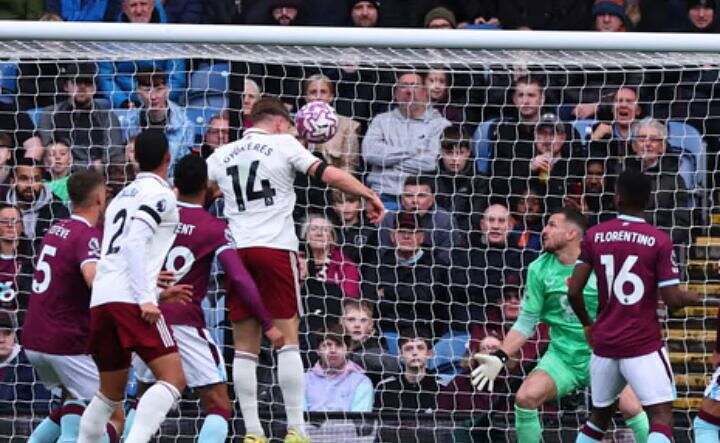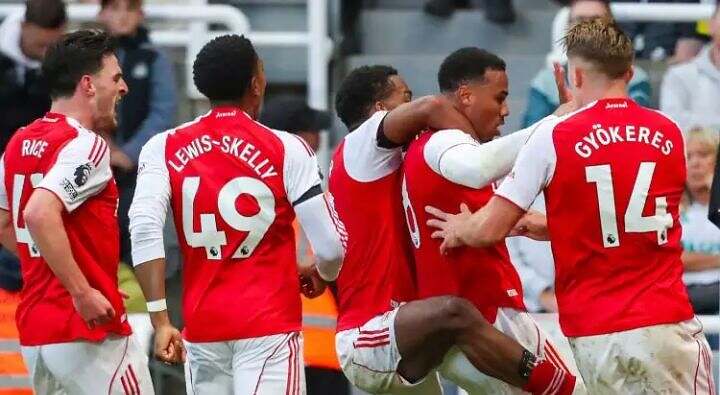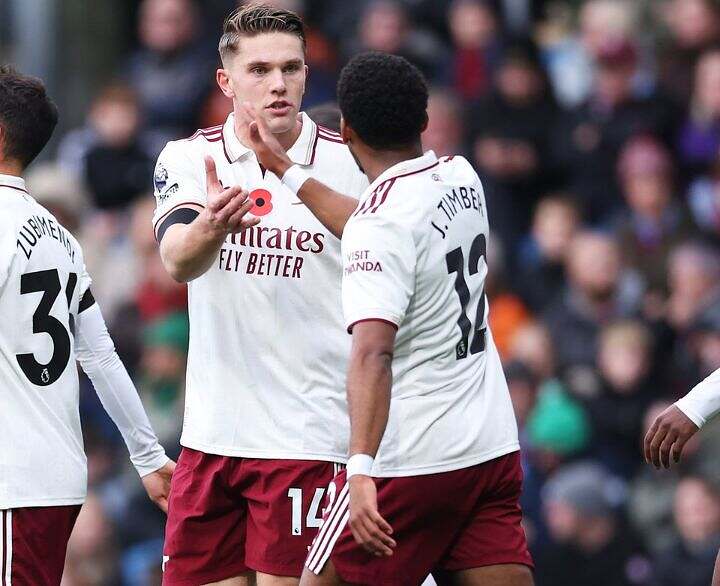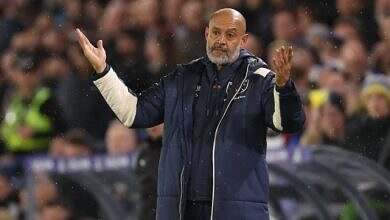Why Set-Piece Goals Have Become the Premier League’s Latest Overblown Moral Panic

It’s all eyes back on the Premier League following a short break in the middle of the week for some light-hearted fun in the Carabao and the continuous distraction of the Liverpool situation, which is inexplicably both deepening and escalating.
And at the moment, that can only mean one thing: freaking out and asking that someone consider the kids anytime someone scores a set-piece goal, especially Arsenal.
Let’s never claim that wild overreactions aren’t a problem in Premier League coverage.
Trending
The set-piece goal is the most recent moral panic to engulf the Premier League (or, more properly, the compelling coverage of the Premier League). Everyone is in agreement that something needs to be done.
You see, there have been a good number of them. A few teams have coincidentally discovered some exceptionally talented long-throw merchants, and the dominant league leaders are especially skilled. And that won’t work.
Since set-piece goals aren’t appropriate goals, are they? No, open play goals are legitimate goals scored by legitimate clubs.
Set-piece goals cannot be the reason for a side to win the Premier League, can they? That would never work. The problem is that it doesn’t matter, and you’re mistaken if you believe it does.
Is it really that easy? As much as anything else, the concept of a “set-piece goal” itself is so ridiculous that it hardly qualifies as a legitimate topic of discussion.
The concept of the “set-piece goal” originated from the school of thought that burdened us with VAR.
This school of thought held that everything in football, a sport whose very essence lies in its flowing and subjective-by-design rhythms, can actually be codified and given a number or declared right or wrong, true or false, good or bad, legal or illegal.
Football, of course, is more difficult to dissect. This is not a weakness; rather, it is the main factor that makes it the largest, most well-liked, and most prosperous sport that humans have ever created.
It is the ideal blend of complexity and simplicity. The fundamentals of football are understood by all, but no one has ever mastered the game.
The reason VAR is a failure is that its proponents don’t know what football is all about.
As a result, the entire sport is being retconned and refitted in an attempt to squish it into a shape where complete certainty can be attained because no one in authority is willing to acknowledge that basic error and the toothpaste is now impossible to get back in the tube. It will never be successful.
The current anxiety over set-piece goals is insignificant in comparison to VAR’s dominance in game management, but it stems from the same idea: all goals, like all choices, can be neatly and simply compartmentalised.

Naturally, they can’t. Set-piece goals fall under the traditional definition of “we know it when we see it,” which applies to all notions that are difficult to define.
However, you quickly run into issues when you attempt to define a set-piece goal in a way that is truly waterproof.
There are many other definitions, but they all have the same flaw. Consider this one, which we highlight to show how difficult it is to truly define this idea rather than to make fun of it.
“Set Piece goals/attempts are those in which the ball begins in a dead ball scenario, such as a corner, a free kick, a penalty, or a throw-in, and ends in a shot before the play phase has broken down into open play.”
Take note of how accurate the first half of that is. Observe how the second half is inevitably and totally different from that. When exactly does a play phase “break down into open play”? It is impossible to define, so you are unable to do so.
It doesn’t really matter, and that’s okay. To get a general notion of how a team operates, it is completely harmless to compile and record “set-piece goals” and “open-play goals” based on some always subjective and occasionally highly arbitrary criteria.
You really can’t be outraged over something that is so intrinsically hazy and nebulous or act as though a spike in one or a dip in the other represents the sky collapsing.
To demonstrate how ridiculous it is to get worked up over these things, we may use simple instances of corner goals from three different Premier League games last weekend.
Micky van de Ven scored twice in Spurs’ victory over Everton, Matty Cash scored for Aston Villa against Man City, and Eberechi Eze scored for Arsenal against Crystal Palace. These objectives are not at all comparable.
Gabriel’s mishandled header caused the ball to drop awkwardly to Eze, who scored with an incredibly creative and improvised finish.
However, Van de Ven’s first goal also came from a second ball, with Rodrigo Bentancur sending back across goal for the centre-back to nod in from close range.
This presents an instant problem if you try to argue that the “second-ball” element means it’s no longer a set-piece goal.
Van de Ven’s goal cannot be included in a definition that excludes Eze’s, but no reasonable argument could characterise that as anything other than a set-piece goal.
Then there’s Matty Cash, who can locate the bottom corner of City’s goal by trick or crook while waving his swinger at a long-range effort.
Once more, there is no convincing argument that it is from open play because it occurs so shortly after the corner.

In fact, the “pattern of play” is key to Opta’s definition of a “set-piece goal.” In actuality, it doesn’t really matter how long the reload into the box takes if all the big boys from the back are still up in attacking positions following a corner or free kick; it’s still a set-piece goal.
With so many guys in unusual places, it hasn’t broken down into open play. By that definition, you’re still looking at a set-piece goal even if Cash had dropped the ball for someone else to shoot or cross back into the area.
Nobody says anything other than praising the flexibility and cunning of that finish if a team other than Arsenal scores that Eze goal.
It would have been the end of football as we know it if Arsenal had defeated Everton with the two goals Van de Ven scored from a combined distance of roughly three and a half yards.
Perhaps even more significant, though, is the fact that this season is already beginning to look like an odd one to be complaining about.
The notion that set-piece goals are more dull or intrinsically inferior to open-play goals is for the birds, since it has been demonstrated that even goals from corners can have such drastically different finishes as the three we’ve just examined here from a single day’s action.
Particularly during a season that is anything but dull. It would mark the conclusion of a 22-year title drought and the crowning of a third different champion in three years, even if it goes as smoothly and predictably as possible.
It is currently impossible to forecast with any degree of certainty who might occupy the European berths at the end of the season, even though we will hold our hands up and admit that we fully expected a return to Big Six supremacy following the summer talent drain from the have-nots to the haves.
Just the fact that “Bournemouth” and “Sunderland” are currently feasible solutions is cause for celebration.
The same is true at the other end of the table, where nothing about the relegation battle can currently be predicted with any degree of conviction due to the determined competence of all three promoted sides.
While identifying Wolves, West Ham and Nottingham Forest as the three poorest clubs at the moment may be simple, is it really possible for anyone to claim, “Well, we know those three are all going down”?
Even though it’s not even November yet, the two biggest teams in the nation are already experiencing a full-blown crisis, and there is currently no trustworthy information available to determine whether or not Chelsea, Spurs, Newcastle, Villa, or even Man City are any good.
The Premier League has not presented a season with more potential for unpredictability and the unexpected since the Leicester Ridiculousness of 2015–16. Treasure and enjoy it.
Don’t complain because some nerd with a laptop is adding a few more goals than you think are ideal to the “set piece” rather than “open play” pile.






